| Sajha
Feature |
|
 |
 |
MANOSE: Himalayan
Bamboo Flautist | View Interview
Origins
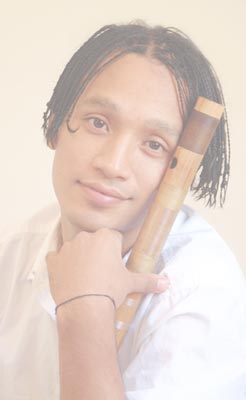 Manose's
hometown, Boudha, Nepal stands on the ancient route leading from the Himalayan
mountains down into the Kathmandu valley. It is just upriver from Nepal's most
holy Hindu temple, and is home itself to an important Buddhist shrine. An influx
of Tibetan refugees who naturally congregated around the great Boudhanath shrine,
and the outward growth of Kathmandu city has created there a nexus where everyone
from religious pilgrims, to rowdy enclaves of traders, and Western adventurers
converged to meet, mingle, haggle, and gawk. Typical of crossroads the world
over, it is dusty and colorful, a Babylon of languages and traditions.
Manose's
hometown, Boudha, Nepal stands on the ancient route leading from the Himalayan
mountains down into the Kathmandu valley. It is just upriver from Nepal's most
holy Hindu temple, and is home itself to an important Buddhist shrine. An influx
of Tibetan refugees who naturally congregated around the great Boudhanath shrine,
and the outward growth of Kathmandu city has created there a nexus where everyone
from religious pilgrims, to rowdy enclaves of traders, and Western adventurers
converged to meet, mingle, haggle, and gawk. Typical of crossroads the world
over, it is dusty and colorful, a Babylon of languages and traditions.
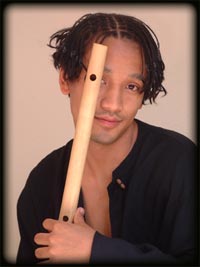 It
was here that eight-year-old Manose fell in love with the bamboo flute one night,
when a fortuitous breeze wafted its song through his bedroom window. Truly,
the sound of the bansuri is seductive. Compared to a silver flute it has a resonate
quality that seems to actually penetrate the listener physically. And because
it is not valved like a silver flute, its potential for subtle expressiveness
is practically limitless. We can understand therefore, young Manose's instant
infatuation.
It
was here that eight-year-old Manose fell in love with the bamboo flute one night,
when a fortuitous breeze wafted its song through his bedroom window. Truly,
the sound of the bansuri is seductive. Compared to a silver flute it has a resonate
quality that seems to actually penetrate the listener physically. And because
it is not valved like a silver flute, its potential for subtle expressiveness
is practically limitless. We can understand therefore, young Manose's instant
infatuation.
He purchased a two-rupee flute
from a street hawker and began to carry it with him in his school bag where
it vied for space with his favorite sling shot. His real relationship with music
began when Manose heard about an old man who played haunting music on the shenai.
That man, Madan Dev Bhatta, a disciple of Ustad Bishmilallah Khan, initiated
Manose into the study of classical raga music, often known as North Indian classical
music.
At the same time, Manose began
to collect cassettes by flute maestro Hariprasad Chaurasia. To augment the lessons
he was getting from Bhatta, Manose would play the cassettes again and again,
trying to copy what he heard, often practicing five or six hours a day. "I
wanted to learn," says Manose. "I wanted to have something."
Musical Achievement
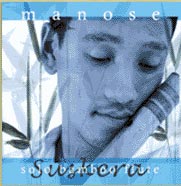 Now,
as a performer in a variety of genres from raga, to Nepali folk, to fusion rock,
his sound he has matured into something at once virile, tender, and playful.
From the demanding study of raga music, he has acquired technical mastery and
an astonishing ability to improvise. At the same time, we find him wonderfully
free to draw inspiration from wherever he finds it, be it the swaying sweetness
of a samba, or the lightening fast lines of Celtic masters. When asked what
or who has had the greatest musical influence on his playing, he thinks for
a moment and says "the sound of the flute."
Now,
as a performer in a variety of genres from raga, to Nepali folk, to fusion rock,
his sound he has matured into something at once virile, tender, and playful.
From the demanding study of raga music, he has acquired technical mastery and
an astonishing ability to improvise. At the same time, we find him wonderfully
free to draw inspiration from wherever he finds it, be it the swaying sweetness
of a samba, or the lightening fast lines of Celtic masters. When asked what
or who has had the greatest musical influence on his playing, he thinks for
a moment and says "the sound of the flute."
He is widely recognized as Nepal's
premiere flautist and is the recipient of national awards including instrumentalist
of the year. And even while living in the United States, he still manages to
be a vital part of the music scene back home. His debut music video airs regularly
on Nepali TV, he is a member of one of the county's most popular pop bands,
and last year he performed in Nepal's first jazz festival where he shared the
stage with Australian great Don Burrows.
In the United States, Manose
performs and records with the likes of Grammy-nominated fusion artist Jai Uttal,
The Chicago Children's Choir, singers Krishna Das and Deva Premal, tabla maestro
Swapan Chowdary, and blue grass great Peter Rowan. He is also a member of the
New Maihar Band, an ensemble created by living legend Ali Akbar Khan. He has
performed in Canada, France, England, Switzerland, Germany, Hong Kong, and Malaysia.
After all this, no matter where
he goes, or what genre his is playing, it is his pure love for the sound of
the flute that remains most palpable is his music. This is clearly a young man
who "has something."
Manose on the Musical
Life, and Playing with 1974AD [Courtesy Manose & Nepalisite]
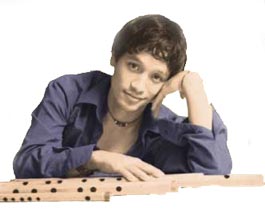 "I
joined 1974AD in 1998. I also play as a solo performer, and with other artist,
so I join the band whenever and where ever I can in the world. I'm very happy
that the band is doing well. Being a rock star is fun but it takes a lot of
energy. It's really beautiful to be able to touch the young generation through
music. I'm happy to be able to introduce them to the bansuri, and maybe open
their eyes to all kinds of music they might not be interested in otherwise.
My musical roots are in Nepali classical, and Nepali folk, but I also play everything
from jazz, Celtic, to kirtan. My philosophy is think not what music can do for
you, but what you can do for the music. So I'm just trying to bring good music
to everyone.
"I
joined 1974AD in 1998. I also play as a solo performer, and with other artist,
so I join the band whenever and where ever I can in the world. I'm very happy
that the band is doing well. Being a rock star is fun but it takes a lot of
energy. It's really beautiful to be able to touch the young generation through
music. I'm happy to be able to introduce them to the bansuri, and maybe open
their eyes to all kinds of music they might not be interested in otherwise.
My musical roots are in Nepali classical, and Nepali folk, but I also play everything
from jazz, Celtic, to kirtan. My philosophy is think not what music can do for
you, but what you can do for the music. So I'm just trying to bring good music
to everyone.
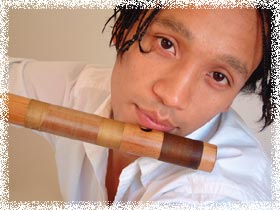 When
1974ad was in the US and I was touring with them here in 2003, the audience
was mostly younger Nepalese living in the US, first and second generation. It's
interesting to see how Nepali people are living abroad, what people keep, and
what they let go of being outside of Nepal. A lot of the other kinds of shows
I do are attended more by non-Nepalese. I get to meet so many interesting people.
One thing, it is very interesting playing for kirtan in the US. People love
it! They even dance! There are a lot of people in the US who have been influenced
by Eastern spirituality and inspired by Eastern culture so there is a base of
interest in what I do. They come to the music with maybe more reverence and
a desire to learn about it than others. Also I get people who are music lovers.
I play for all ages and all kinds of people; I love my audience. Somehow I'm
able to communicate with them, so I feel the same toward them no matter where
or what kind of show. A true listener is the same whether it is on Earth or
Mars. I'm really lucky to get such appreciation for my music in the US and in
Nepal both. I feel it's a good achievement for me that I can be a professional
musician and devote myself full time to music. That way I can touch that many
more people! Being in the US, getting encouragement from musicians who I respect,
it shows how even a boy from the far corner of the world can do so much if he
is focused on his goals.
When
1974ad was in the US and I was touring with them here in 2003, the audience
was mostly younger Nepalese living in the US, first and second generation. It's
interesting to see how Nepali people are living abroad, what people keep, and
what they let go of being outside of Nepal. A lot of the other kinds of shows
I do are attended more by non-Nepalese. I get to meet so many interesting people.
One thing, it is very interesting playing for kirtan in the US. People love
it! They even dance! There are a lot of people in the US who have been influenced
by Eastern spirituality and inspired by Eastern culture so there is a base of
interest in what I do. They come to the music with maybe more reverence and
a desire to learn about it than others. Also I get people who are music lovers.
I play for all ages and all kinds of people; I love my audience. Somehow I'm
able to communicate with them, so I feel the same toward them no matter where
or what kind of show. A true listener is the same whether it is on Earth or
Mars. I'm really lucky to get such appreciation for my music in the US and in
Nepal both. I feel it's a good achievement for me that I can be a professional
musician and devote myself full time to music. That way I can touch that many
more people! Being in the US, getting encouragement from musicians who I respect,
it shows how even a boy from the far corner of the world can do so much if he
is focused on his goals.
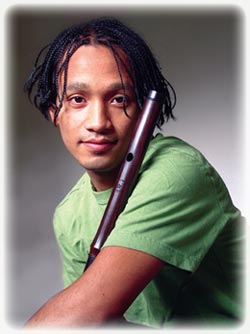 I
love all my concerts and they're all so different. Its hard to choose a favorite,
but I have to mention one I did last year with Jai Uttal, a Grammy-nominated
world musician from the San Francisco area. We played for the Chicago Childrens'
Choir's musical production of the Ramayana. I personally liked it because the
whole thing had an awareness of oneness. It involved more than 60 very talented
kids from all different ethnicities who played the characters from the Ramayana
and sang. It was accessible for both eastern and western audience members, and
I felt proud of being part of it, and representing Nepal with my bansuri. It
was so moving that some of us cried while we played and so did people in the
audience.
I
love all my concerts and they're all so different. Its hard to choose a favorite,
but I have to mention one I did last year with Jai Uttal, a Grammy-nominated
world musician from the San Francisco area. We played for the Chicago Childrens'
Choir's musical production of the Ramayana. I personally liked it because the
whole thing had an awareness of oneness. It involved more than 60 very talented
kids from all different ethnicities who played the characters from the Ramayana
and sang. It was accessible for both eastern and western audience members, and
I felt proud of being part of it, and representing Nepal with my bansuri. It
was so moving that some of us cried while we played and so did people in the
audience.
I also do some teaching. I started
teaching in Nepal when I was seventeen or eighteen. I got my start at the Kirateshwar
Sangeet Ashram, and started teaching for The University of Wisconsin's Nepal
program, and Naropa, and various American study-abroad programs. That's partly
what brought me to the US in the beginning. I met a lot of western people through
that teaching. When I first came to the US in 1998, I realized that one of the
best places to work on spreading this music, other than Kathmandu, would be
California. Some of the best classical player in the world, like Zakir Hussain,
and Ali Akbar Khan live here. California is very diverse and open-minded. Now
days, I do some teach through the Ali Akbar College. It's also beautiful to
share music that way. My musical path isn't about entertainment, it's about
something else that every human should know. That s what I'm trying to spread
through my music, that awareness of the possibility for oneness. That's my ultimate
ambition.
I'm planning to be in Nepal for
at least a couple months this winter and do lots of concerts and playing with
1974AD. In May I'll be in Europe with a world music ensemble. If anyone wants
more info they can email me at manose@manosemusic.com. Also, my tour schedule
is posted on my website so you can check it out at www.manosemusic.com."
Viewed times
DISCLAIMER
SAJHA.COM does not control the information delivered in the SAJHA FORUMS, and
it has no obligation to monitor the postings. However, SAJHA.COM reserves the
right at all times to disclose any information as necessary to satisfy any applicable
law, regulation, legal process or governmental request, or to edit, refuse to
post or to remove or deny access to any information or materials, in whole or
in part, for any reason whatsoever, in SAJHA.COM's sole discretion.
BY THEIR VERY NATURE, DISCUSSION
FORUMS MAY CARRY OFFENSIVE, HARMFUL, INACCURATE OR OTHERWISE INAPPROPRIATE MATERIAL,
OR IN SOME CASES, POSTINGS THAT HAVE BEEN MISLABELED OR ARE OTHERWISE DECEPTIVE.
WE EXPECT THAT YOU WILL USE CAUTION AND COMMON SENSE AND EXERCISE PROPER JUDGMENT
WHEN POSTING TO OR VIEWING KURAKANI.
Your use of the Web Site is at
your own risk. If you are dissatisfied with any of the Materials or other contents
of the Web Site or with these Terms and Conditions, or other policies, your
sole remedy is to discontinue use of the Web Site.
IN NO EVENT SHALL SAJHA.COM BE
LIABLE TO ANY USER OR ANY THIRD PARTY FOR ANY DAMAGES WHATSOEVER (INCLUDING,
WITHOUT LIMITATION, DIRECT, INDIRECT, INCIDENTIAL, CONSEQUENTIAL, SPECIAL, EXEMPLARY
OR LOST PROFITS) RESULTING FROM THE USE OR INABILITY TO USE THE WEB SITE OR
THE MATERIAL, OR ANY LOSS INCURRED AT AN ADVERTISED or PARTNER or SPONSOR SITE,
WHETHER BASED ON WARRANTY, CONTRACT, TORT, OR ANY OTHER LEGAL THEORY, AND WHETHER
OR NOT SAJHA.COM IS ADVISED OF THE POSSIBILITY OF SUCH DAMAGES.
Current Server
time: {ts '2024-11-16 14:47:08'}


